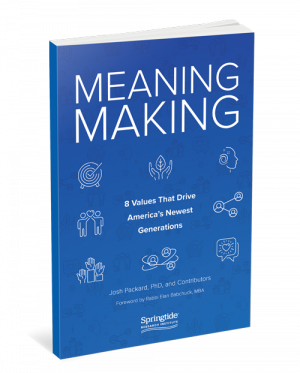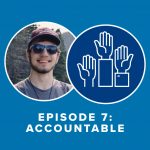Relational: Creating Meaningful Connections through Bridging and Bonding
Below is an excerpt from Meaning Making: 8 Values That Drive America’s Newest Generations. Follow along on the blog for more excerpts, check out the additional resources on our Meaning Making page, and buy the book here.
Springtide data confirm that young people desire bridging relationships—the kind of connections and networks that are casual but still extremely meaningful. Walking into a classroom or office and recognizing friendly faces, feeling a sense of belonging on a sports team or board meeting: these kinds of connections are important. The people in that classroom, office, team, or meeting may not be best friends with one another, but they share relationships of great worth.
Sometimes these bridging relationships can be difficult to build and maintain. But the ability and opportunity to do so is valuable because It is often from the wide network of bridging relationships that bonding relationships are first found.
Dr. Varun Soni, dean of religious life at the University of Southern California (USC), writes in a July 2019 op-ed for the Los Angeles Times:
What I have noticed in my work with students is that many of them face the same hidden root challenge: loneliness. . . . I never got the question in my first five years at USC that I now get almost daily from students: “How do I make friends?” Students may have thousands of friends online, but few in real life; they may be experts at talking with their thumbs, but not so much with their tongues. As a result, many feel as though they don’t have a tribe or a sense of belonging. They feel disconnected from what it means to be human.
USC has taken positive steps to address this issue of on-campus loneliness. These include a dedicated mindfulness training app and free mindfulness programs; a for-credit first-year course that focuses on emotional intelligence, healthy relationships, self-care, resiliency, and human flourishing; a new artificial intelligence well-being assistant; classes on making meaningful relationships at USC; yoga classes, drum circles, friendship courses, community teas, laughing groups, and connection workshops.
Recently the campus appointed its first director of belonging. Among other responsibilities, she teaches classes on making meaningful relationships at USC through its Campfires program. Campfires are conversations that USC describes as groups of two or three or larger where participants begin by surrendering laptops and phones to the center of the gathering and then watching a video, followed by a period of asking one another questions.
The questions are intended “to move people from acquaintance into deeper connection with each other,” according to the Office of Religious and Spiritual Life website. Clear guidelines for asking and responding to questions are provided, and student leaders are trained in the “‘arts of Campfires’ in order to make their campus organizations more conducive to the formation of meaningful relationships among their members.”
To be clear, meaningful connections don’t have to be vulnerable or intimate. It’s meaningful to connect with someone over a shared love for a local baseball team or a favorite food. Those shared preferences might form the foundation for working together on an upcoming project, which may lead to more bonding. Or it may not—the point isn’t collecting bonding relationships but forming meaningful connections at a variety of depth levels.
Initiating and developing both bridging and bonding relationships is sometimes challenging for young people today. Their social skills or experiences have been formed with different priorities than other generations—and that’s okay. But it means that institutions like schools, houses of worship, and workplaces now carry the onus of creating spaces and structures to facilitate bridging and bonding for and among young people.
Act on the Data: Bridging relationships are often the seed for bonding relationships. Young people need both. Don’t underestimate the value of the bridging opportunities—chances for a wide net of people to gather—you provide in your caring for young people.







